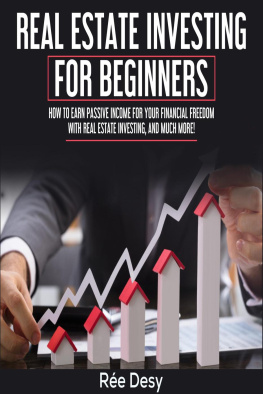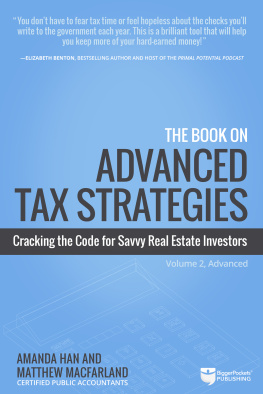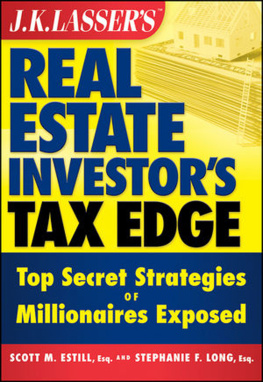

Copyright 2007 by Sandy Botkin. All rights reserved. Except as permitted under the United States Copyright Act of 1976, no part of this publication may be reproduced or distributed in any form or by any means, or stored in a database or retrieval system, without the prior written permission of the publisher.
ISBN: 978-0-07-166154-6
MHID: 0-07-166154-9
The material in this eBook also appears in the print version of this title: ISBN: 978-0-07-147235-7, MHID: 0-07-147235-5.
All trademarks are trademarks of their respective owners. Rather than put a trademark symbol after every occurrence of a trademarked name, we use names in an editorial fashion only, and to the benefit of the trademark owner, with no intention of infringement of the trademark. Where such designations appear in this book, they have been printed with initial caps.
McGraw-Hill eBooks are available at special quantity discounts to use as premiums and sales promotions, or for use in corporate training programs. To contact a representative please e-mail us at bulksales@mcgraw-hill.com.
This publication is designed to provide accurate and authoritative information in regard to the subject matter covered. It is sold with the understanding that neither the author nor the publisher is engaged in rendering legal, accounting, or other professional service. If legal advice or other expert assistance is required, the services of a competent professional person should be sought.
From a Declaration of Principles jointly adopted by Committee of the American Bar Association and a Committee of Publishers.
TERMS OF USE
This is a copyrighted work and The McGraw-Hill Companies, Inc. (McGraw-Hill) and its licensors reserve all rights in and to the work. Use of this work is subject to these terms. Except as permitted under the Copyright Act of 1976 and the right to store and retrieve one copy of the work, you may not decompile, disassemble, reverse engineer, reproduce, modify, create derivative works based upon, transmit, distribute, disseminate, sell, publish or sublicense the work or any part of it without McGraw-Hills prior consent. You may use the work for your own noncommercial and personal use; any other use of the work is strictly prohibited. Your right to use the work may be terminated if you fail to comply with these terms.
THE WORK IS PROVIDED AS IS. McGRAW-HILL AND ITS LICENSORS MAKE NO GUARANTEES OR WARRANTIES AS TO THE ACCURACY, ADEQUACY OR COMPLETENESS OF OR RESULTS TO BE OBTAINED FROM USING THE WORK, INCLUDING ANY INFORMATION THAT CAN BE ACCESSED THROUGH THE WORK VIA HYPERLINK OR OTHERWISE, AND EXPRESSLY DISCLAIM ANY WARRANTY, EXPRESS OR IMPLIED, INCLUDING BUT NOT LIMITED TO IMPLIED WARRANTIES OF MERCHANTABILITY OR FITNESS FOR A PARTICULAR PURPOSE. McGraw-Hill and its licensors do not warrant or guarantee that the functions contained in the work will meet your requirements or that its operation will be uninterrupted or error free. Neither McGraw-Hill nor its licensors shall be liable to you or anyone else for any inaccuracy, error or omission, regardless of cause, in the work or for any damages resulting therefrom. McGraw-Hill has no responsibility for the content of any information accessed through the work. Under no circumstances shall McGraw-Hill and/or its licensors be liable for any indirect, incidental, special, punitive, consequential or similar damages that result from the use of or inability to use the work, even if any of them has been advised of the possibility of such damages. This limitation of liability shall apply to any claim or cause whatsoever whether such claim or cause arises in contract, tort or otherwise.
Contents
Dedications and Acknowledgments
I dedicate this book to my wife, Lori, and my children, Jeremy, Matthew, and Allison, for their endless patience and sense of wonder and playfulness, and to my students, who helped craft this work with feedback and suggestions. I thank Jim Piccalo for letting me test my programs with his real estate school, and I thank Pat Quinlin, my personal editor, who significantly helped in the edits of the manuscript. I also thank Sally Glover and Mary Glenn, my editors at McGraw-Hill, for their input and timely suggestions.
There were numerous other folks who provided suggestions for this book. I thank Howard Kaplan, attorney at law in Omaha, Nebraska; Debbie Spoons of Tax Sentinel I; The Manhattan Tax Club; and Mike Sampson, Professor of Taxation at American University, for their reviews of this book.
I also want to specifically thank Allison Botkin for her timely edits of all cartoons and illustrations contained in this book.
Finally, I want to dedicate this book to the U.S. Congress, which makes this work not only possible, but necessary.
Introduction
Historically, real estate has been one of the greatest tax shelters in the United States. A solid knowledge of real estate taxation can increase most peoples rate of return on their homes and investment property by 10 percent to 20 percent per yearno kidding! During years when real estate doesnt appreciate (which happens in all areas), tax benefits may be your only return on investment.
Sadly, many terrific tax-planning techniques that the wealthy have been using for years are not known by most people. Most real estate books currently on the market dont have this information.
Now youll learn what the rich have been doing for decades regarding real estate. All strategies are footnoted to the Internal Revenue Code (IRC), IRS Regulations (REGS), IRS rulings, and case law. Your accountant can check out everything quickly for validity. This book is based on my course, Wealth-Building Real Estate Tax Strategies, which I have been presenting nationwide for many years and is available on my Web site: www.taxreductioninstitute.com .
Myths
After reading this book, you may wonder why you werent aware of this information years ago. There are several myths that cause overpayment of taxes and lost deductions.
Myth 1: My accountant takes care of my taxes/my spouse takes care of our taxes. These seven words impoverish more people than any other myth. Its like saying My doctor takes care of my body. Wouldnt it be great if we never had to exercise, could eat all the fattening foods we wanted, and once a year go to our doctor for a Roto-Rooter job? The point is that the tax savings your accountant can find for you are small compared to what you can save if you are pursuing your own tax strategies. If you dont know what to tell your accountant and dont have the tax strategies in place, you will lose thousands of dollars in deductions and write-offs.
Myth 2: I didnt make a lot of money this year, so I dont need to know about tax planning. This is absolutely false. If you own investment property or a home, you have access to the last great tax shelters in this country: your own business and real estate. Interestingly, if your investment real estate creates a loss, you can usually use a portion or even all of that loss against any form of other income such as dividends, rents, wages, and gains if you plan correctly and meet certain tests.
Example: Richard and Mary earned $80,000 in salary but had investment real estate that generated a $10,000 loss deduction. If they are considered active investors (which I will describe later in this book), they may use this $10,000 loss against their $80,000 salary, giving them a net taxable income of $70,000.
Next page









